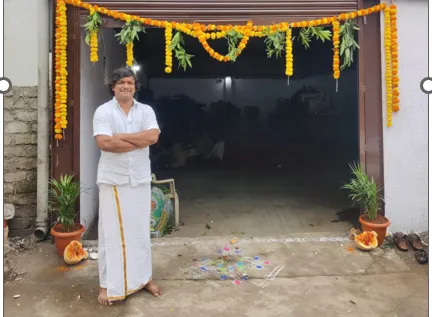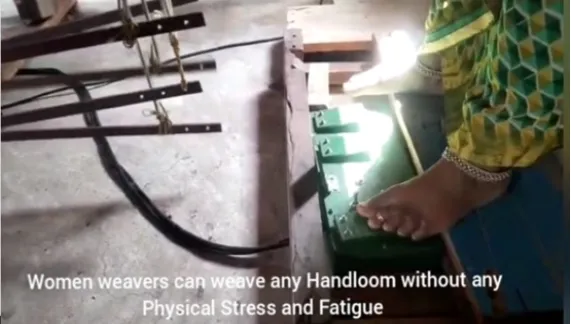Meet Sivakumar Modha who is using tech to ease the pain of handloom weavers
It took 14 years for Sivakumar Modha to build Modha Tech, a machine that would help decrease costs and save time for weavers. In 2022, he developed the Modha Pedal Operating Machine to ease the physical stress and pain faced by weavers during the weaving process.
Handloom weavers, on average, lift between 20-45 kg weight with manual pedals around 5,000-8,000 times in a day.
“This continuous process of lifting huge weights causes knee and back pain. By the time the weavers reach the age of 40-45 years, they cannot weave anymore. At that age, they do not have other skills and remain without a livelihood. Their earnings become zero,” Sivakumar Modha, an innovator who has dedicated his life to ease the pain of handloom weavers, says.

Sivakumar Modha
There are 26.73 lakh weavers in India and 8.48 lakh allied workers and 72% among them are women, according to the fourth Handloom Census 2019-20, the latest year for which such data is available.
According to Modha, women workers have it worse. In addition to weaving, they have to also take care of their households and this can include physical work. Also, during their menstruation period, most of them are unable to work on the loom and therefore could lose around 25% of their monthly income.
His innovation—the Modha Pedal Operating Machine for all Jacquard-based handlooms, which was launched in January 2022—recently received the Jury’s Special at the Aarohan Social Innovation Awards instituted by the Infosys Foundation.
Modha is also confident of winning the President’s Award next year.
He explains how the machine works. “It’s a machine that is fastened to a loom and using its pedal switches, the weaver uses his big toe to work the motor fitted to it. No load is felt by the weaver on his knees and back and he can work for longer periods without fatigue.”
“With this machine, even older people or physically disabled can use the hand-operated switch and work without having to worry about pain,” he adds.
Aided by Hyderabad-based NGO, Palle Srujana, which invested in the project, Modha has sold 220 machines so far.
“The response to the innovation has been encouraging. I have noticed that while it’s slow, it’s also steady. This is because weavers take some time to adapt to new innovations. They would observe its working for some time before investing,” he says.
Priced between Rs 15,000-27,000, Modha admits the machine is out of reach for most weavers. He’s hoping that banks and financial institutions step forward and offer loans to weavers to buy it.
“I am in touch with government agencies, and if their support comes through, the weavers will be able to procure the machine at a subsidised price. I am hoping that sales will pick up quickly by next year,” he adds.
Weaving success

In 2002, Sivakumar Modha was all set to join a Masters in Computer Applications course in Hyderabad when an unplanned visit to a village near his hometown of Hindupur in Andhra Pradesh changed the course of his life.
“I visited Modha, a handloom village with my father. There I saw the plight of handloom weavers. Despite the hard work, they were under tremendous physical and mental stress due to various reasons. I decided to give up my MCA plans and focus on how I could help them,” Modha tells SocialStory.
The decision may have been impulsive, but his heart was in the right direction.
However, Modha had no family background in the handloom industry and he had to learn everything from scratch. From 2002 to 2005, he moved among the handloom workers, learning how to work the loom, weaving and in the process understanding what the weavers were facing in their day-to-day lives.
During this time, Modha learned that the Jacquard loom used by the weavers employed the almost two-centuries-old method of using a manual punch card system for saree designing. However, owing to fast-moving trends in the handloom sector, this method was causing immense losses to the weavers.
Moving forward, digitally
He elaborates, “This is a manual system where digital designs are converted into punch cards. Thousands of punch cards are required to make one saree. While these can be reused, they become useless or redundant when trends change. These could become obsolete in just 3-4 months and weavers have to bear the huge cards of making new punch cards.”
Modha wanted to develop an innovation that could ease the weavers’ dependence on punch cards. In 2006, he moved to Hyderabad and took up a job in a transport company to make ends meet while he continued to work on different innovations to address this problem.
“It took 14 years, many trials, hits and misses to launch Modha Tech, an electronic jacquard machine that replaced the traditional punch card with a pen drive that contained the images for the design. Simply put, with this digital method, designs are transferred from a computer onto a pen drive, which is inserted into the machine, and then used to design a saree. This saves 90% of the weaver’s time and also removes the need for manual punch cards,” he explains.
However, Modha’s innovative machine can’t take off due to the huge costs involved.
“I need at least Rs 80-90 lakh to establish a production unit to produce this machine for commercial use. It’s a complicated process to secure loans for anything connected to the handloom industry,” Modha says.
He didn’t let this disappointment linger. In 2018, he started working on another innovation to ease the physical stress on handloom workers, which led to the launch of the Modha Pedal Operating Machine.
Modha is a one-man army—taking care of manufacturing, sales and marketing. He says word-of-mouth and videos on social media platform are helping in raising awareness about the machine. Through all this, he says his wife has been his biggest cheerleader and supporter.
“Every time I failed, my wife told me not to lose hope and work harder. In this long and arduous journey, not once did I want to give up,” he signs off.
Edited by Affirunisa Kankudti






